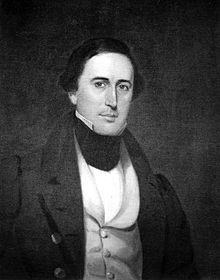William H. Gist
| William Henry Gist | |
|---|---|
 |
|
| Member of the Executive Council of South Carolina | |
|
In office December 14, 1861 – September 29, 1862 |
|
| Governor | Francis Wilkinson Pickens |
| 68th Governor of South Carolina | |
|
In office December 10, 1858 – December 14, 1860 |
|
| Lieutenant | Merrick E. Carn |
| Preceded by | Robert Francis Withers Allston |
| Succeeded by | Francis Wilkinson Pickens |
| 43rd Lieutenant Governor of South Carolina | |
|
In office December 12, 1848 – December 13, 1850 |
|
| Governor | Whitemarsh B. Seabrook |
| Preceded by | William Cain |
| Succeeded by | Joshua J. Ward |
| Member of the South Carolina Senate from Union District | |
|
In office November 25, 1844 – November 24, 1856 |
|
| Preceded by | William Kennedy Clowney |
| Succeeded by | Joseph Fincher Gist |
| Member of the South Carolina House of Representatives from Union District | |
|
In office November 23, 1840 – November 25, 1844 |
|
| Personal details | |
| Born |
August 22, 1807 Charleston, South Carolina |
| Died | September 30, 1874 (aged 67) Union County, South Carolina |
| Political party | Democratic |
| Spouse(s) | Louisa Bowen Mary Rice |
| Profession | Statesman |
William Henry Gist (August 22, 1807 – September 30, 1874) was the 68th Governor of South Carolina from 1858 to 1860 and a leader of the secession movement in South Carolina. He was one of the signers of the Ordinance of Secession on December 20, 1860, which effectively launched the Confederacy.
Born in Charleston, South Carolina, on August 22, 1807, Gist was the illegitimate child of merchant Francis Fincher Gist and Mary Boyden. He moved with his father to Union County, South Carolina, in 1811 and came under the guardianship of his uncle, Nathaniel Gist, upon the death of his father in 1819. His uncle legally obtained the Gist last name for William Henry and sent him to Columbia to study law at South Carolina College (which became the University of South Carolina after the Civil War ended). Gist was expelled in 1827 because he had led a boycott of Steward's Hall due to the living restrictions imposed by the trustees of the college.
Nevertheless, Gist passed the Bar examination and returned to Union to build Rose Hill Plantation on the land that his father had left him. Bricks were made on-site to construct the 2 1⁄2-story Georgian style mansion, and it took four years to complete. He successfully managed the plantation, and it steadily grew in size and importance. Twice, Gist ran into difficulties with the law for alleged involvement in duels, but both times escaped without punishment.
Gist won election to the South Carolina House of Representatives in 1840 as a strong supporter of states' rights to chattel slavery, and he was elected to the South Carolina Senate in 1844. He served three terms in the SC state Senate before being elected by the General Assembly as the 68th Governor of South Carolina. Gist's home at Rose Hill Plantation served as the Governor's Mansion during his term as governor.
...
Wikipedia
